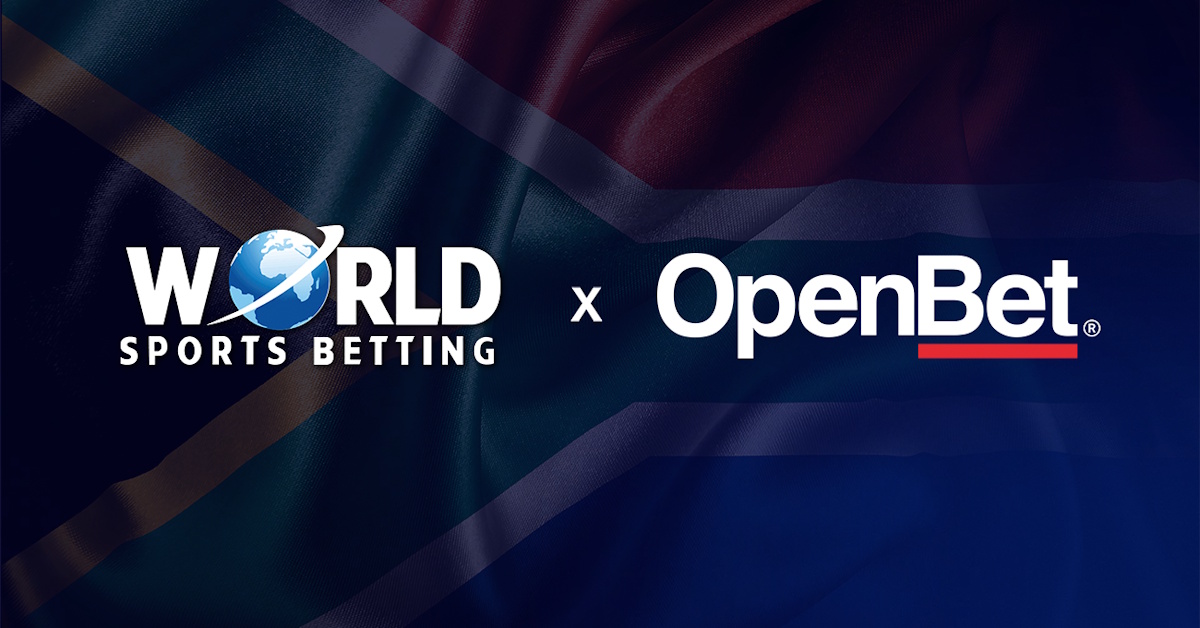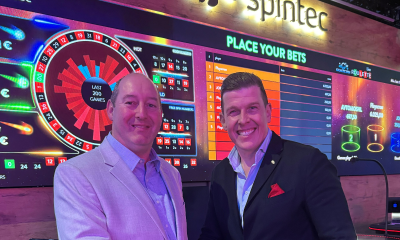Latest News
Sportradar Reports Strong Growth and Increased Profitability and Cash Flow

Sportradar Group AG, the leading global technology company enabling next generation engagement in sports and provider of business-to-business solutions to the global sports betting industry, today announced financial results for its third quarter ended September 30, 2022.
Third Quarter 2022 Highlights
- Revenue in the third quarter of 2022 increased 31% to €178.8 million ($175.2 million)1 compared with the third quarter of 2021. 2022 year-to-date revenue grew 28% compared to the same nine months in 2021.
- The RoW Betting segment, accounting for 56% of total revenue, grew 28% to €100.9 million ($98.9 million)1, driven by strong performance from our Managed Betting Services (MBS).
- U.S. segment revenue grew 61% to €31.6 million ($31.0 million)1 compared to the third quarter of 2021, driven by strong market growth and positive adoption of in-play betting. The U.S. segment turned profitable for the first time since the Company’s initial public offering and generated a positive Adjusted EBITDA margin of 11%.
- The Company’s Adjusted EBITDA2 in the third quarter of 2022 increased 75% to €36.5 million ($35.8 million)1 compared with the third quarter of 2021 as a result of strong revenue growth even with continuous investments in the Company’s growing business.
- Adjusted EBITDA margin2 was 20% in the third quarter of 2022, an increase of 500 bps compared to the quarter for the prior year period and 400 bps higher compared to the second quarter of 2022.
- Adjusted Free Cash Flow2 in the third quarter of 2022 increased to €33.9 million, compared to €32.9 million for the prior year period. The resulting Cash Flow Conversion2 was 93% in the quarter.
- During the quarter, the Company prepaid €200.0 million of its outstanding debt. As of September 30, 2022, total debt was €236.9 million, and cash and cash equivalents totaled €512.5 million.
- The Company has raised its guidance for revenue and the lower end of its Adjusted EBITDA2 range for the full year 2022.
| Key Financial Measures | Q3 | Q3 | Change | |
| In millions, in Euros | 2022 | 2021 | % | |
| Revenue | 178.8 | 136.8 | 31% | |
| Adjusted EBITDA2 | 36.5 | 20.9 | 75% | |
| Adjusted EBITDA margin2 | 20% | 15% | – | |
| Adjusted Free Cash Flow2 | 33.9 | 32.9 | 3% | |
| Cash Flow Conversion2 | 93% | 158% | – |
1 For the convenience of the reader, we have translated Euros amounts at the noon buying rate of the Federal Reserve Bank on September 30, 2022, which was €1.00 to $0.98.
2 Non-IFRS financial measure; see “Non-IFRS Financial Measures and Operating Metrics” and accompanying tables for further explanations and reconciliations of non-IFRS measures to IFRS measures.
Carsten Koerl, Chief Executive Officer of Sportradar said: “Our strong performance in the third quarter exceeded our expectations across all key financial metrics. We consistently managed to grow revenue, profitability and cash flows despite adverse market conditions during the first three quarters of 2022. The Company exceeds expectations quarter-in and quarter-out, and as a result of our operational performance – in particular the U.S. and the betting rest-of-world business – as well as our organizational streamlining, we are able to raise our full year guidance for revenue and increase the lower end of our Adjusted EBITDA range.”
“We are proud of the continuous success of our U.S. operations. We managed to generate a U.S. profit for the first time in the third quarter, displaying solid operational leverage in the business model. Underpinning this success is the extension of our long-term partnership with FanDuel. This partnership is a testimony for our strategy, to expand our relationships and become an embedded technology provider for our customers, based on strategic long-term deals with our league partners.”
Ulrich Harmuth, Interim Chief Financial Officer added: “The financial results in the third quarter demonstrated that Sportradar consistently has managed to grow almost three times faster than the underlying betting market and our growing scale has led to margin expansion – as indicated by the U.S. segment turning profitable in the third quarter. As a result of this strong momentum and based on what we can see today, our 2023 preliminary expectations are for revenue to grow in the mid-20’s percent while expanding Adjusted EBITDA margin above 2022 levels.
Segment Information
RoW Betting
- Segment revenue in the third quarter of 2022 increased by 28% to €100.9 million compared with the third quarter of 2021. This growth was driven primarily by increased sales of our higher value-add offerings including Managed Betting Services (MBS), which increased 84% to €38.2 million, and Live Odds Services, which increased 12% to €27.1 million. MBS growth was attributable to a record annualized turnover3 of €19.0 billion and the success of our strategy to move existing customers to higher value add products.
- Segment Adjusted EBITDA2 in the third quarter of 2022 increased 8% to €48.2 million compared with the third quarter of 2021. Segment Adjusted EBITDA margin2 decreased to 48% from 57% in the third quarter of 2021 driven by inorganic investments into AI capabilities for our MBS business, expanding our sport rights portfolio, as well as temporary cost savings in sport rights and scouting from the prior year due to the COVID-19 pandemic.
RoW Audiovisual (AV)
- Segment revenue in the third quarter of 2022 increased by 14% to €33.1 million compared with the third quarter of 2021. Growth was driven by cross-selling audiovisual content to existing data customers and expanding AV portfolio sales with existing AV customers.
- Segment Adjusted EBITDA2 in the third quarter of 2022 increased 32% to €12.6 million compared with the third quarter of 2021. Segment Adjusted EBITDA margin2 increased to 38% from 33% compared with the third quarter of 2021 as a result of AV revenue growth.
United States
- Segment revenue in the third quarter of 2022 increased by 61% to €31.6 million compared with the third quarter of 2021. This growth was driven by a strong increase of U.S. betting services, driven by cross-selling non-data products to betting operators as well as benefiting from our customers’ growth as a result of a development in the underlying market and new states legalizing betting.
- Segment Adjusted EBITDA2 in the third quarter of 2022 was €3.4 million compared with a loss of (€6.6) million in the third quarter of 2021, primarily driven by enhanced operating leverage as a result of the growing scale of our business despite continuous investments in the U.S. segment’s products and content portfolio. Segment Adjusted EBITDA margin2 improved to 11% from (34%) compared with the third quarter of 2021.
2 Non-IFRS financial measure; see “Non-IFRS Financial Measures and Operating Metrics” and accompanying tables for further explanations and reconciliations of non-IFRS measures to IFRS measures.
3 Turnover is the total amount of stakes placed and accepted in betting.
Costs and Expenses
- Purchased services and licenses in the third quarter of 2022 increased by €18.1 million to €47.5 million compared with the third quarter of 2021, reflecting continuous investments in content creation and processing, higher event coverage and higher scouting costs. Of the total, approximately €13.7 million was expensed sports rights.
- Personnel expenses in the third quarter of 2022 increased by €16.9 million to €68.3 million, an increase of 33% compared with the third quarter of 2021. Adjusted for inorganic hires, personnel cost grew 27% compared to the third quarter in 2021.
- Other Operating expenses in the third quarter of 2022 decreased by €4.9 million to €20.3 million, as a result of our efforts to increase the effectiveness of our central services and due to one-time costs resulting from our initial public offering in September 2021.
- Total sport rights costs in the third quarter of 2022 increased by €5.9 million to €34.6 million compared with the third quarter of 2021, primarily a result of costs associated with new acquired rights in 2022 for the ITF, UEFA and ATP.
Recent Business/Company Highlights
- Sportradar and FanDuel sign long-term agreement for Official NBA data through the 2030-31 season. Providing FanDuel with a comprehensive portfolio of betting products and entertainment tools, Sportradar remains the preferred data and odds supplier to FanDuel through 2031. Using official NBA data, Sportradar and FanDuel will collaborate to enhance the sports betting experience with new offerings such as certain player tracking data to create props and same game parlays. Additionally, FanDuel will use Sportradar’s proprietary Live Channel Trading (LCT) product.
- Sportradar reaffirms leadership position in cricket market with partnerships with Australian Premier Cricket competitions. Sportradar announced the renewal of partnership agreements with the top tier club cricket competitions in Tasmania, Queensland, and Western Australia. Currently, Sportradar is partners with every single state and territory cricket governing body in Australia. Extensions with these clubs enable Sportradar to remain the official streaming partner until mid-2025
- Sportradar and International Golf Federation enter integrity partnership. Sportradar’s Integrity Services (SIS) unit signed a multi-year integrity partnership with the International Golf Federation (IGF). Under the terms of the initial two-year agreement, SIS will provide bet monitoring through its Universal Fraud Detection System (UFDS) for several IGF competitions. Sportradar Integrity Services have detected more than 7,300 suspicious matches during the past 17 years, with over 600 taking place in 2022 alone.
- Tennis Data Innovations and Sportradar team up to expand official tennis data distribution. The partnership sees the launch of a “new secondary feed,” to enable the provision of betting-related services based on official ATP Tour and ATP Challenger Tour scores to a suite of global bookmakers. Of significance, the partnership sees the ATP change its data framework, allowing bookmakers to have uninterrupted access to official data, as scores to date have been delivered directly from the umpire’s chair.
- Sportradar continues to evolve its organizational structure to set it up for continued success in achieving its strategic goals around growth, organizational effectiveness and efficiency. The Company is optimizing its organization by appointing global leaders for content creation, product development and commercial excellence – with the U.S. retaining a dedicated go-to-market approach. With this new structure, the Company will become faster in decision-making and execution, and will be more effective and efficient in serving global customers with a growing global product portfolio. The net effect will also be to significantly reduce the number of direct reports to the CEO.
Annual Financial Outlook
Sportradar has updated its outlook for revenue and Adjusted EBITDA for fiscal 2022 as follows:
- Sportradar has raised its revenue outlook for fiscal 2022 to a range of €718.0 million to €723.0 million ($703.6 million to $708.5 million)1, from its previous range of €695.0 million to €715.0 million representing prospective growth of 28% to 29% over fiscal 2021.
- Outlook for Adjusted EBITDA2 is narrowed to a range of €124.0 million to €127.0 million ($121.5 million to $124.5 million)1 from the previous range of €123.0 million to €133.0 million, representing 22% to 24% growth versus last year.
- Adjusted EBITDA margin2 is expected to be in the range of 17% to 18%.4
Powered by WPeMatico
accumulators
Record-breaking volumes at the World Sports Betting Cape Town Met, powered by OpenBet technology

OpenBet, a global leader in betting and gaming technology, powered record-breaking volumes for World Sports Betting (WSB) during the 2026 World Sports Betting Cape Town Met, processing more than three times WSB’s typical daily activity with zero downtime.
The Cape Town Met is one of South Africa’s premier horseracing events, drawing intense traffic that tests platform performance. Less than a year after migrating to OpenBet’s unified technology stack, WSB demonstrated the resilience and scalability of its platform under extreme demand.
OpenBet’s Player Account Management (PAM) technology and sportsbook solution — phased in with PAM going live in February 2025 and the sportsbook in October 2025 — now underpin WSB’s enterprise-grade wagering infrastructure across both digital and retail channels. The integrated system delivers streamlined KYC, a unified wallet, accurate reporting and a robust compliance framework designed for South Africa’s regulatory environment.
Enhanced features available to WSB customers include 50-leg accumulators, partially redeemable free bets, advanced Telebet telephone betting and integrated pools betting for sports and racing through OpenBet’s advanced trading system.
“With the World Sports Betting Cape Town Met, we processed more than three times the usual volume with zero downtime, showcasing the strength and scalability of our technology,” said Runa Walia Desai, Chief Customer Experience Officer at OpenBet. “This milestone also extends our footprint into Africa, reinforcing our position across six continents.”
Warren Tannous, CEO of World Sports Betting, added that OpenBet’s modular solution gives the operator the confidence to expand its sportsbook offering and support increased user engagement while maintaining performance and compliance.
The post Record-breaking volumes at the World Sports Betting Cape Town Met, powered by OpenBet technology appeared first on Eastern European Gaming | Global iGaming & Tech Intelligence Hub.
10000x multiplier
Choice Gaming Launches Evra Crash in Exclusive Collaboration with Patrice Evra

Choice Gaming has officially launched Evra Crash, a new multiplayer crash game developed in exclusive collaboration with football legend Patrice Evra.
The title blends high-energy crash mechanics with football culture, delivering a synchronized, shared-table experience designed to boost player engagement and social interaction.
A Football Icon Powers the Gameplay
At the center of Evra Crash is Patrice Evra, one of football’s most recognizable personalities. His presence adds authenticity and competitive intensity to the gameplay, reinforcing the game’s energetic, community-driven concept. The partnership between Choice Gaming and Evra aims to merge competitive spirit with immersive entertainment in the fast-growing crash gaming segment.
Multiplayer Crash Experience
Unlike traditional single-session crash games, Evra Crash is built around real-time shared rounds:
- All players join the same round simultaneously
- Fully networked multiplayer participation
- Visible, synchronized gameplay across users
This structure creates a social crash environment where anticipation builds collectively, increasing engagement and enhancing the thrill of each round.
Game Features & Performance Metrics
Evra Crash offers a balanced gameplay structure designed for broad player appeal:
- RTP: 95%
- Maximum Multiplier: 10,000x
- Volatility: Low
The low-volatility model provides consistent entertainment while maintaining the potential for high multipliers, positioning Evra Crash as an accessible yet exciting crash title in the iGaming market.
Cross-Platform Optimization
Built for seamless performance across environments, Evra Crash is:
- Fully mobile-optimized
- Compatible with land-based gaming solutions
- Designed for consistent cross-platform gameplay
Whether accessed online or in physical gaming venues, players experience uninterrupted performance and smooth gameplay integration.
The post Choice Gaming Launches Evra Crash in Exclusive Collaboration with Patrice Evra appeared first on Eastern European Gaming | Global iGaming & Tech Intelligence Hub.
Latest News
EARN YOUR PLACE AMONG THE BEST AS POKERSTARS REVEALS SCHEDULE FOR PRESTIGIOUS SPRING CHAMPIONSHIP OF ONLINE POKER

More than $45 million guaranteed across 400 tournament opportunities for all players to earn their greatness
The full schedule for poker’s first major online series of the year, PokerStars prestigious Spring Championship of Online Poker (SCOOP), has been unveiled featuring 136 events and more than $45 million guaranteed.
From March 1 to 25, players have the chance to earn their greatness once more and battle for an acclaimed SCOOP title across three weeks of elite online poker action. The 136-event schedule (with a total of 400 tournaments) offers low, medium, and high buy-in levels from $5.50 to $15,000, and a wide range of formats including No-Limit Hold’em, PLO, 8-Game, Mystery Bounties, Turbo, and Deep Stack events, making SCOOP accessible for everyone.
KEY SCHEDULE HIGHLIGHTS
The flagship Main Events will be a schedule highlight and will award a total of $5.5 million across the NLHE Main Events on March 22, and $550,000 across the PLO Main Events on March 23.
- $109 SCOOP NLHE Main Event Low – $1.5 million guaranteed
- $1,050 SCOOP NLHE Main Event Med – $2 million guaranteed
- $5,200 SCOOP NLHE Main Event High – $2 million guaranteed
- 109 SCOOP PLO Main Event Low – $100,000 guaranteed
- $1,050 SCOOP PLO Main Event Med – $200,000 guaranteed
- $5,200 SCOOP PLO Main Event High – $250,000 guaranteed
Other highlights of the 18th edition of SCOOP include:
- March 1 – $215 Sunday Million PKO – $1 million guaranteed
- March 8 – $22 Mystery Sunday Special, $300,000 guaranteed – All-in Shoot Out for United Kingdom & Ireland players to award an Emerald Pass to the Irish Open on March 10 at 7am GMT
- March 8 – $109 Sunday Million PKO – $1 million guaranteed
- March 15 – $55 Mini Sunday Million PKO – $500,000 guaranteed – All-in Shoot Out for United Kingdom & Ireland players to award an Emerald Pass to the Irish Open on March 17 at 7am GMT
- March 15 – $530 Sunday Million – $1 million guaranteed
As well as the huge prizes and trophies on offer, players can also compete in the SCOOP Leaderboards where an additional $100,000 in cash prizes will be awarded across the Low, Medium and High Player of the Series Leaderboards.
As ever, there are a number of qualification routes giving players the chance to qualify into SCOOP events for a fraction of the buy-in. Routes include satellites from just $0.55, the SCOOP Lucky Dip where $500,000 in SCOOP tickets are up for grabs and the $55 Power Path Express SCOOP Edition, on March 1st,where more than $200,000 in SCOOP Power Passes and Main Event tickets will be awarded to boost players’ grind to greatness. Finally, all players are still in time to crack open a SCOOP Prize Vault and earn a SCOOP ticket worth up to $1,050 upon opt-in.
“SCOOP is where greatness isn’t given, it’s earned. Every title represents weeks of preparation, relentless competition and beating the toughest fields in online poker. That’s what makes a SCOOP win so special,” said Steve Clarricoats, Associate Director of Poker Operations at PokerStars. “With a huge schedule and accessible buy-ins and formats, SCOOP remains the title every online player wants on their record.”
For 17 years, SCOOP has been appointment poker of the highest order and winning a SCOOP title has been a bucket list dream for poker players all over the world. More than $1.4 billion in prize pools have been awarded to players since SCOOP started in 2009, with some of the world’s best players earning coveted SCOOP trophies.
Sweden’s Simon “C. Darwin” Mattsson is the greatest player in SCOOP history having earned 14 titles, followed by fellow Swede Niklas “Lena900” Astedt and the UK’s Benny “RunGodlike” Glaser who both have 11 titles, with Benny being the most decorated player in COOP history also having a record-leading 16 WCOOP titles.
For more information about SCOOP head to the PokerStars website or PokerStars Blog.
The post EARN YOUR PLACE AMONG THE BEST AS POKERSTARS REVEALS SCHEDULE FOR PRESTIGIOUS SPRING CHAMPIONSHIP OF ONLINE POKER appeared first on Americas iGaming & Sports Betting News.
-

 Amusnet6 days ago
Amusnet6 days agoWeek 7/2026 slot games releases
-

 Aphrodite’s Kiss6 days ago
Aphrodite’s Kiss6 days agoLove on the Reels: Slotland Introduces “Aphrodite’s Kiss”
-

 Brino Games6 days ago
Brino Games6 days agoQTech Games integrates more creative content from Brino Games
-

 Denmark7 days ago
Denmark7 days agoRoyalCasino Partners with ScatterKings for Company’s Danish Launch
-

 Baltics7 days ago
Baltics7 days agoEstonia to Reinstate 5.5% Online Gambling Tax From March 1
-

 Booming Games7 days ago
Booming Games7 days agoTreasure Hunt Revival — Booming Games Launches Gold Gold Gold Hold and Win
-

 Bet Rite7 days ago
Bet Rite7 days agoSpintec Expands into Canada with Bet Rite
-

 ELA Games7 days ago
ELA Games7 days agoELA Games Unveils Tea Party of Fortune — A Magical Multiplier Experience



















